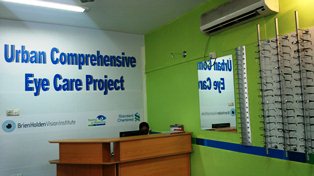Join a powerful, unprecedented alliance for better eye health for all.
Join IAPB-
Choose an alternate language here
The link between poor vision and poverty is unfortunately all too apparent in Sri Lankan communities. Poor vision drastically reduces an individual’s education and employment opportunities. For many local people, having access to readily available eye care and spectacles has helped them maintain their employment and unlocked several education and income generation opportunities for them. Brien Holden Vision Institute has been actively providing quality eye care services in Sri Lanka since 2004 especially to marginalised communities in the population.
Later, with an aim to strengthen access to primary eye care services among poor urban communities in Sri Lanka, the Institute started Colombo Urban Comprehensive Eyecare project in 2010, delivering sustainable refractive services to the urban poor. This project is a result of Standard Chartered Bank’s Seeing is Believing (SiB) Phase IV initiative and encompasses establishment of two vision centres; an optical lab and an optical workshop.
Health systems strengthening form the basis of the project which contributes towards the implementation of an effective, efficient, responsive and equitable strategy in eye health. The project has been successfully implemented through a partnership with the Ministry of Healthcare and Nutrition, and the Vision2020 Secretariat. As part of the project, an optical workshop has been established at the National Eye Hospital in Colombo in July 2010 that provides free spectacles to poor and deserving people who cannot afford to purchase a good pair of spectacles.
The project provided support for the development of infrastructure; equipment; training of spectacle technicians; and inventory to establish the optical workshop. The project also provided support to hire an administrator (short-term) at the optical workshop for effective implementation of the project activities. The challenges faced during the implementation process were addressed by i) continuously engaging with all stakeholders; ii) focusing on capacity development of the technical and administrative staff; iii) ensuring technical support.

The responsibility of human resources and operational costs is with the Government which is critical for the continuity of services. The Institute is committed to provide technical and mentoring support to the staff working in the optical workshop in the future as part of its capacity development initiatives. Till date the optical workshop has provided nearly 40,000 spectacles to people in need, of which around 60% have been provided to women and young girls.
Given the long-term nature of the project and the challenges associated, it was more likely that the partners will need to renegotiate in order to accommodate for the changes in strategy. However, by incorporating a robust communication plan; consultative processes; and sharing of learning, the project has managed to successfully engage with the Government ensuring long-term health system sustainability.
Sumrana Yasmin